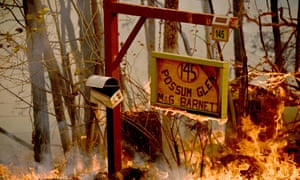Attacks on science by conservative politicians and commentators are
no substitute for preparation when it comes to natural disasters
It’s not just climate protesters who powerful voices are trying to
silence in Australia, it’s anyone who wants to talk about the
bigger-picture causes to the problems Australia is facing.
In modern Australia it has become “inappropriate” to talk about why our rivers are running out of water, why our aged care centres are running out of food and nappies, and why our fire brigades are running out of firetrucks. But it’s impossible to solve problems when you can’t talk about the underlying causes.
When people crash their car going around a tight bend we can sympathise with their families while discussing whether speed, fatigue, alcohol or poor road design were to blame. It’s not impossible to be sensitive to victims and serious about the cause at the same time.
Climate change
makes bushfires worse. Even if we catch an arsonist who lights a fire,
the fact is the fires they light will burn further and faster than they
would have if the world had burned less coal, and the temperature was
lower than we have made it.In modern Australia it has become “inappropriate” to talk about why our rivers are running out of water, why our aged care centres are running out of food and nappies, and why our fire brigades are running out of firetrucks. But it’s impossible to solve problems when you can’t talk about the underlying causes.
When people crash their car going around a tight bend we can sympathise with their families while discussing whether speed, fatigue, alcohol or poor road design were to blame. It’s not impossible to be sensitive to victims and serious about the cause at the same time.
With the same amount of effort into managing fuel loads and cutting firebreaks, a fire lit by an arsonist will spread further today than it would have in past decades. The embers from hotter fires, moving across drier ground, can spark new fires further away from the firefront than they once did.
And as climate change ramps up the intensity of bushfires in Australia, we will need to put in a lot more resources simply to hold the amount of fire damage constant over time. Experienced firefighters have tried to tell the prime minister, but he literally will not listen.
If we can’t talk about the underlying reasons why bushfires are becoming more frequent, we can’t possibly talk about how to manage either the fires Australia is experiencing today or the far worse ones we will experience in the decades to come.
Plenty of sick people refuse to go to the doctor for fear of hearing they need to change their lifestyle. Such denial is understandable for individuals but it is inexcusable for those elected to protect us. The evidence that climate change makes bushfires worse is as clear as the evidence that burning fossil fuels causes climate change. The Australia Institute summarised the science in 2006.
But in Australia powerful people don’t need evidence to get in their way. They have the right to block their ears and the right to shout down their critics. In turn, it comes as no surprise that many of the loudest voices denying the link between climate change and catastrophic bushfires are the same voices that deny, or diminish, the link between burning coal and climate change.
In a democracy, power is the ability to talk crap and get away with it. Baseless attacks on climate science by conservative politicians and commentators make clear where the power lies in Australia.
Messenger shooting is so widespread, and the shots fly overwhelmingly in the one direction, that when Jo Evans, a deputy secretary of the Department of Environment, tiptoed around whether climate trends were getting better or worse to a Senate committee, there was no outrage and virtually no coverage.
But when Adam Bandt dared to mention the link between climate change and catastrophic bushfires, the full weight of the conservative commentariat moved rapidly to attack him and others who dared link cause with effect.
Australia is one of the richest countries in the world and, if we wanted to put more resources into reducing greenhouse gas emissions, increasing the number of firefighting vehicles or even paying volunteers to fight our fires, there is nothing to stop us doing that. Except that we have repeatedly elected governments with a preference for cutting taxes over investing in solutions.
But just as we can’t talk about how climate change makes bushfires worse, we aren’t supposed to talk about how Australia’s choice to be one of the lower-taxed developed countries in the world comes at the cost of us having some of the most poorly funded public services in the developed world.
Similarly, while it’s considered responsible to have royal commissions into the failure of the “markets” we have created for water, aged care and financial services, it is crazy talk to suggest we need to have a royal commission into the complex mess that is the last 20 years of privatisation and deregulation of government services.
There aren’t always simple answers to complex problems, and it’s not just OK, but essential, that we vigorously debate the veracity of evidence, ideas and priorities. But Australia isn’t having vigorous debates, it’s not even having vicious debates. On the big issues there is plenty of vicious but absolutely no debate.
Australia is governed by people who refuse to listen to inconvenient evidence and who attack their opponents instead of debating them with opposing ideas. The last election suggests such a combination of apathy and confidence is a successful electoral strategy. But, as this week’s fires show, denial is no substitute for preparation when it comes to natural disasters.
Denying the truth doesn’t change the facts.
• Richard Denniss is chief economist at the Australia Institute

No comments:
Post a Comment